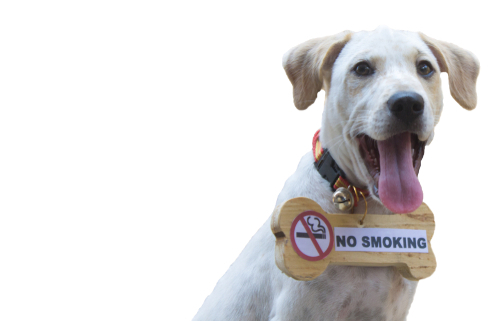Secondhand Smoke & Dogs
We should all know the dangers of smoking. There are many health risks involved when someone smokes. Unfortunately, these risks extend to nearby people who inhale secondhand smoke. We wonder if secondhand smoke can similarly affect pets. The answer is yes. Dogs (and other pets) can suffer the negative consequence of tobacco products by simply breathing the smoky air.
Why do you think we care about secondhand smoke? The facts are shocking. Tobacco smoke contains more than 7,000 chemicals, many of which are toxic or cause cancer. Simply breathing in the vicinity of an active smoker increases exposure to these dangerous compounds. Understanding that secondhand smoke impacts human health is crucial, but pet owners need to understand the negative impact that it has on their pets as well.
Secondhand smoke can negatively impact people by causing respiratory issues from coughing and sneezing to asthma and shortness of breath. Living in a house with a smoker puts our pets at greater risk for health problems. For example, dogs who are exposed to secondhand smoke have more eye infections, allergies, and respiratory issues, including lung cancer. This makes sense because a dog’s sense of smell is significantly better than humans.
Long-nosed dogs tend to have it worse though. The toxins in tobacco smoke accumulate in the nasal mucus, putting long-nosed dogs at greater risk for tumors in their lengthy snouts. Knowing that smoking is bad for our health may not be enough to make us quit. However, knowing that it may have a negative impact on our pet’s health just might be the jump start we need to kick the habit. If you cannot quit, be proactive in ensuring that your pet isn’t surrounded by the secondhand smoke. Take your smoke breaks outside and utilize air purifiers inside to yield cleaner air.



